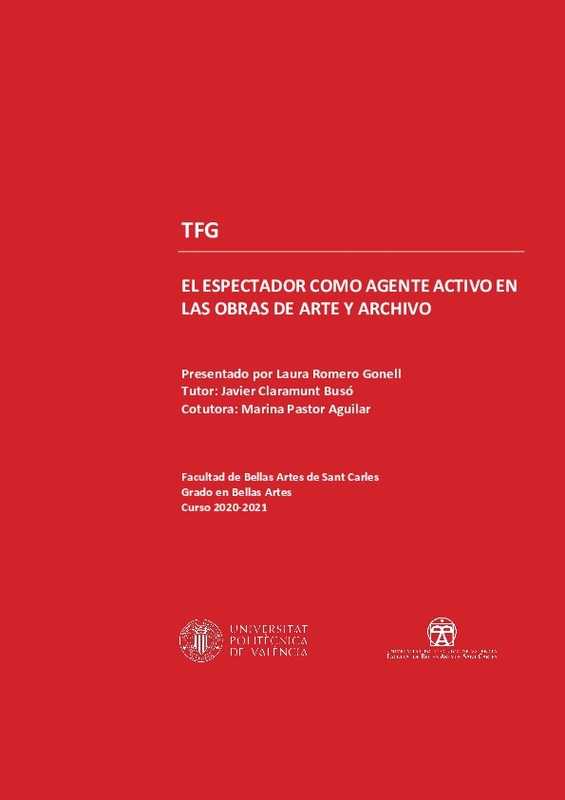|
Resumen:
|
[ES] El espectador como agente activo en las obras de Arte y Archivo es el título que pone nombre a un trabajo teórico que pretende evidenciar la participación activa del espectador en obras de Arte y Archivo. Veremos que ...[+]
[ES] El espectador como agente activo en las obras de Arte y Archivo es el título que pone nombre a un trabajo teórico que pretende evidenciar la participación activa del espectador en obras de Arte y Archivo. Veremos que el origen de lo que denominamos aquí Arte y Archivo se sitúa posteriormente a los sesenta coincidiendo con el establecimiento de la crítica institucional como obra de arte. En esos momentos el espectador cambia de ser sujeto pasivo, que sólo observa, a ser parte activa de la obra, agente activo en su cierre semántico.
En las herramientas de la producción de Arte y Archivo encontramos recursos que motivan este giro del espectador. Veremos la ocultación de la autoría como parte clave en la motivación hacia el espectador para buscarle sentido a la obra. También observaremos que, en contraposición a esa ocultación, otros autores dirigen la mirada del espectador hacia la emoción que desean transmitir al realzar ciertas cuestiones propias.
Hablaremos de cómo artistas como Hanne Darboven, On Kawara, Ignasi Aballí y Daido Moriyama; permiten que la asepsia de sus lenguajes artísticos participe de manera activa en el cierre semántico de la obra por parte del espectador. Otros artistas, sin embargo, utilizarán nexos subjetivos para orientar al espectador hacia un discurso contemplando la posibilidad de la multiplicidad de vivencias y su posible resultado como Aleksandra Mir, Christian Boltanski o Francesc Torres.
[-]
[EN] The viewer as an active agent in works of Art and Archives is the title that gives name to a theoretical work that aims to show the active participation of the spectator in works of Art and Archives. We will see that ...[+]
[EN] The viewer as an active agent in works of Art and Archives is the title that gives name to a theoretical work that aims to show the active participation of the spectator in works of Art and Archives. We will see that the origin of what we call here Art and Archive is located after the sixties, coinciding with the establishment of institutional criticism as a work of art. In those moments, the viewer changes from being a passive subject, who only observes, to being an active part of the work, an active agent in its semantic closure.
In the tools of the production of Art and Archive we find resources that motivate this turn of the viewer. We will see the concealment of authorship as a key part in motivating the viewer to find meaning in the work. We will also observe that, in contrast to this concealment, other authors direct the viewer's gaze towards the emotion they wish to convey by highlighting certain issues of their own.
We will talk about how artists like Hanne Darboven, On Kawara, Ignasi Aballí and Daido Moriyama; they allow the asepsis of their artistic languages to participate actively in the semantic closure of the work by the viewer. Other artists, however, will use subjective links to guide the viewer towards a discourse contemplating the possibility of the multiplicity of experiences and their possible result, such as Aleksandra Mir, Chistian Boltanski or Francesc Torres.
[-]
|







